Port au Prince and its metropolitan area is home to around 2.6 million people, roughly a quarter of Haiti’s population. Haiti suffers from a high triple burden of malnutrition. For example, according to the 2018 Global Nutrition Report: 22% of children aged under 5 have stunting of growth; 46% of women of reproductive age (WRA) are anaemic; and 58% of adult women, 51% men, are overweight or obese.
In order to undetrstand contemporary food environments, we need to understand the historical processes and events that shaped them. Current contexts for nutrition policy and action cannot be disassociated from past influences.
This pilot study builds on work in Kingston, Jamaica, funded by a MRC-AHRC GCRF Global Public Health Partnership Award, to understand historical and epidemiological transitions in urban Caribbean foodscapes, and complements research on sustainable urban development in GDAR.
The study aims to explore how historical changes in foodscapes in Port au Prince relate to changes in the burdens of malnutrition and provide a basis for new policy relevant research questions.
Methods
Data and literature review
Identification, initial description and collation of relevant online data sources and literature, from historical through to contemporary, on aspects of the food supply, dietary intakes, and burdens of malnutrition and related health outcomes. This will include relevant anthropological and economic research papers.
Online newspaper archival research
Research the publicly available online archive of the daily newspaper Le Nouvelliste from 1945 to date – availablethrough the Digital Library of the Caribbean (dLOC) https://dloc.com – for content on changes in media discourse on food and relevant major environmental, political and economic changes and disruptions.
Semi-structured qualitative interviews
Interviews with key stakeholders from agricultural, food chain and health sectors to provide narrative accounts on changes in Port au Prince’s foodscapes, and to assist in identifying archival material, including government policy documents and data sources not found in part A and relevant to changing food security, sovereignty and nutrition. Oral history interviews with community members on changes in food sourcing, preparation and diets over their life times and those of their parents and grandparents
People
Study team:
- Predner Duvivier (UEH, Haiti)
- Marilise Rouzier (UEH, Haiti)
- Nigel Unwin (Cambridge/Exeter, UK)
- Conny Guell (Exeter, UK)
